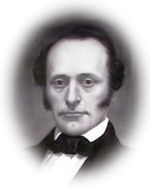—The Sixty-ninth New York Regiment, (altogether composed of Irishmen,) under the command of Col. Corcoran, arrived at Washington, from the Annapolis Junction, Md., where, with the exception of one company which preceded them on Tuesday, they have been on duty for several days past.—National Intelligencer, May 8.
—Governor Andrew, the Mayors of Lowell and Lawrence, and others, met at the State House, in Boston, Mass., for the purpose of identifying the bodies of the Massachusetts soldiers killed in Baltimore. Several articles which were the property of the deceased were exhibited, but failing to identify the bodies by these, the company proceeded to the vault beneath King’s Chapel, where the coffins were opened. The first corpse was at once recognized as Sumner H. Needham of Lawrence, by two of his brothers. The second was recognized as that of Addison O. Whitney of the Lowell City Guards, by three of his intimate friends. He was reported as among the missing when the regiment reached Washington. He died from a shot in the left breast. He was a spinner in the Middlesex Mills, and has a sister at Lowell. The third body proved to be that of Luther C. Ladd of Lowell, also of the Lowell City Guards. He had not been heard from since the fight, but a letter was received from his brother in the regiment at Washington stating that he was missing. The body was identified by a brother-in-law of Ladd. He was about eighteen years of age, a machinist, and was born at Alexandria, N. H. Ho was shot in the thigh, and probably bled to death at once. His face was somewhat swollen, and gave evidence of rough usage.—Boston Traveller, May 8.
—The mouth of James River, and Hampton roads are under strict blockade. The blockading vessels are the frigate Cumberland, steamships Monticello and Yankee, and three or four steam tugs.—The World, May 4.
—Ellsworth’s Regiment of Fire Zouaves arrived at Washington. Their march through the city was a complete ovation. They were greeted with great cheering and other demonstrations of enthusiasm. The splendid appearance of the regiment, both as to numbers and equipments, caused great surprise, and elicited universal praise.—N. Y. Tribune, May 8.
—The adjourned meeting of merchants to take into consideration the action necessary in regard to the state license, was held at Wheeling, Va. The Committee made a report setting forth the law in reference to the matter, submitted a resolve to the effect that we are good citizens of the State of Virginia, and at the same time hold ourselves loyal citizens of the United States, and will maintain allegiance to the same as heretofore; that we are willing to pay a license tax so long as Virginia is in the United States, but we are not willing to pay revenue to the present usurped government at Richmond, which, without the consent of the people of Virginia, has assumed to absolve us from allegiance to the United States, recommending the merchants of Wheeling and Ohio county to withhold the payment of taxes for the present. The resolutions were unanimously adopted. A German announced that the commissioner of the revenue resigned to forward the patriotic undertaking.—The World, May 3.
—Judge Campbell of the United States Supreme Court, who resides in Alabama, sent in his resignation. He is a Unionist, but feels bound to adhere to the fortunes of his State.— N. Y. Tribune, May 8.
The Marine Artillery of Rhode Island (flying artillery) arrived in Washington having a battery of six pieces, apparently perfect, like all we have thus far seen from that gallant little State, in every appointment of military art that can give efficiency to this most effective arm of modern warfare. The battery is served by about one hundred and sixty men, who are experienced cannoneers, and who, we learn, have left behind them an equal number, ready at a moment’s notice to tender their services to the Government. The Rhode Island regiment of infantry, twelve hundred strong, appeared also in the streets on parade, attracting universal admiration for the military precision of their movements and the fine soldiery bearing of both officers and men.
The Artillery made a visit to the President of the United States about five o’clock in the afternoon. He received them in front of the mansion, and was complimented in return by three hearty cheers as they passed in review. —National Intelligencer, May 8.
—The New Orleans Picayune, of to-day, says: “We heard but recently of a united North to defend and preserve the Union—now we hear of a united North to subjugate the South. The change is rapid. It shows the increasing strength of those whose permanent success would be destructive of liberty. These are the enemies the South has to combat. A Southern victory at Washington would not only strike terror into their ranks, but go far towards releasing the good and estimable people of the North from a thralldom which has become as terrible as it is degrading. We hope to have the pleasure, ere many days, of chronicling the glorious achievement.”
—The national flag was hoisted over the Interior Department at Washington. It was enthusiastically greeted by the dense mass of spectators and by the Rhode Island regiment, whose appearance and drill, together with their music, elicited general praise. They were accompanied by Governor Sprague and suite in full uniform.
The President and Secretaries Seward and Smith were near the staff when the flag was raised, and having saluted it, they were in turn cheered.
The regiment, having re-entered the building where they are quartered, sung “Our Flag still Waves.”—N. Y. Evening Post, May 8.
—The religious press presents a singular and varied view of the political affairs of the United States.—(Doc. 128.)










